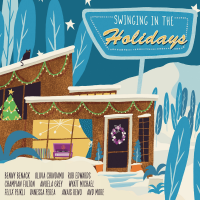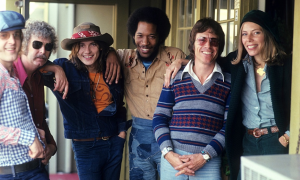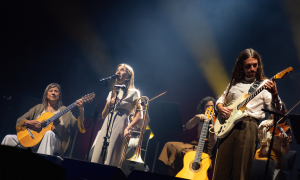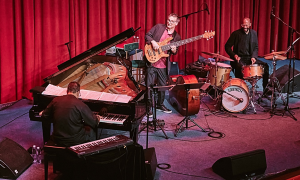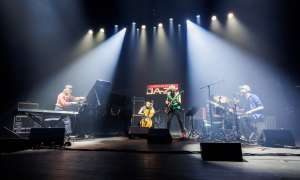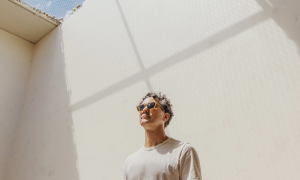Home » Jazz Articles » Profile » Fred Hersch: Live At the Village Vanguard
Fred Hersch: Live At the Village Vanguard
If anyone really listens to me they'll know that I don't sound anything like Bill Evans. It's lazy journalism. They think white guy, plays trio, plays ballads, it's either Keith Jarrett or Bill Evans.
"I felt it was time to make a record that was just about playing, about what we do. Of course the Vanguard is the place to do that," he said over eggs and English Breakfast tea. "I love the fact that it's so basic. It doesn't change. No credit cards. No 'Charlie Parker burgers.' Basically jazz and cocktails. People are there for the music."
Hersch's previous trio, with Gress and drummer Tom Rainey, played together for eight years. Two years ago he formed a last minute quintet to play at the Vanguard. Rainey wasn't available so he asked Nasheet Waits, who he had never heard before, to join.
"People I trusted said he was happening," explained Hersch. "He was available, and I immediately liked him. So I decided to make a change in the drum chair, and when we were at the Vanguard last May I asked him to make the live recording."
The first time Hersch played at the legendary club was with Joe Henderson in the early '80s. "Everybody was very approachable. Joe didn't have a record deal, no one had tour managers," he said. Hersch misses those bygone days. His once rough neighborhood has turned into "a shopping mall," with a new Crate and Barrel across the street from Pottery Barn.
"Twenty-five years ago it really was gritty and funky, and the people were more accessible. Now everybody's cocooning in and emailing. Everyone's got voice mail, cell phone, email. It' s just a different way of communicating. There isn't a center, a place like Bradley's, a living room where musicians just hang out."
When Hersch moved to New York in 1977, after attending the New England Conservatory in Boston, he spent much of his time at the now defunct club Bradley's. With nightly piano/bass duos "it was the place to hang out if you were a pianist," Hersch said. The 21-year-old quickly became a hot commodity. He played with Stan Getz, Art Farmer, Toots Thielemans and Jane Ira Bloom, among others.
"The way that I've always grown is that I just end up doing the things that get thrown at me," he said. "I had never written for orchestra before, then I booked myself a concert with orchestra and had to write a bunch of music. I've never written a huge virtuoso piano piece, but this thing just came at me so I went with it. I tend to try to throw myself into something and see what happens." The 25-minute piano piece he refers to consists of 24 variations on a Bach chorale. He wrote it at the MacDowell Artist Colony in New Hampshire where he does most of his writing. In fact he's probably there right now working on a piece that incorporates the poetry of Walt Whitman.
"I've been wanting to do something with text," Hersch explained. "Walt Whitman is very timely in terms of being one of the great Americans. I love his attitude of don't give a shit what anyone thinks of you. Embrace your life." As a gay man living with HIV, Hersch can relate to Whitman's philosophy. Surrounded by a scene that might seem macho and unaccepting, Hersch found camaraderie from the beginning.
"When I first came on the jazz scene in the mid '70s I saw it as this very wacky world," said the Cincinnati native. "It was like a collection of misfits. There was a certain romance about it—hanging out at clubs with people my parents wouldn't approve of. I felt like I could belong. They didn't care if you were green." When he moved to New York, Hersch said he was not as up front about revealing his homosexuality. But about 20 years ago his friend and mentor bassist Sam Jones died. "He died and I never told him I was gay. We were very intimate together when we played music and we never talked about it. I never really told him who I am."
That realization prompted Hersch to become a visible public spokesperson for AIDS awareness. Newsweek featured him. NPR did shows on him. His three benefit albums Last Night When We Were Young, Fred Hersch and Friends, and The Richard Rodgers Centennial Jazz Piano Album have raised over $250,000.
"There were very few performing artists who were out about HIV," he said. "I had just gotten a Grammy nomination. Lots of people said it would ruin my career. Two years later I signed with Nonesuch. Ten years later my career is bigger and better than ever."
Classical commissions have been coming in, and a collaboration with vocalist Norma Winstone, Songs & Lullabyes (Sunnyside), comes out in April. "It's a polar opposite to the trio album. I like things to be different. It's a real personal album," he said.
"Personal" surrounds Hersch's mystique. On stage at his piano, he shares his inner emotions with the audience. At times he slumps down low to the keys, and the sensitivity of his touch barely makes a sound. But something profound is there. Something stealthily audible'divinely intimate.
Still, people make comparisons. 25 years ago Hersch was playing in Los Angeles with Art Farmer when a man approached him after the set. He said he sounded like "a perfect blend between Ramsey Lewis and Lalo Schifrin," Hersch recalled. "That was his frame of reference. He was so sweet about it and meant it as a compliment. Maybe he's got two jazz records and those are the only two."
Hersch is tired of the Bill Evans comparison. "If anyone really listens to me they'll know that I don't sound anything like Bill Evans. It's lazy journalism. They think white guy, plays trio, plays ballads, it's either Keith Jarrett or Bill Evans. It's just not true." Thelonious Monk, Ahmad Jamal and Earl Hines were big influences he explained. "Of course I listened to Bill Evans, and I listened to McCoy [Tyner], and Teddy Wilson. I listened to everyone everybody listens too."
Looking back on the past 25 years, Hersch amazes himself. "It keeps branching out and getting richer and more interesting. I still feel like I'm getting better as a player. I feel like I'm just now getting to a point where I'm playing at my potential. Put aside the bullshit and get to the music. I have a lot more confidence now. I'm blossoming right now."
Tags
PREVIOUS / NEXT
Fred Hersch Concerts
Support All About Jazz
 All About Jazz has been a pillar of jazz since 1995, championing it as an art form and, more importantly, supporting the musicians who make it. Our enduring commitment has made "AAJ" one of the most culturally important websites of its kind, read by hundreds of thousands of fans, musicians and industry figures every month.
All About Jazz has been a pillar of jazz since 1995, championing it as an art form and, more importantly, supporting the musicians who make it. Our enduring commitment has made "AAJ" one of the most culturally important websites of its kind, read by hundreds of thousands of fans, musicians and industry figures every month.













